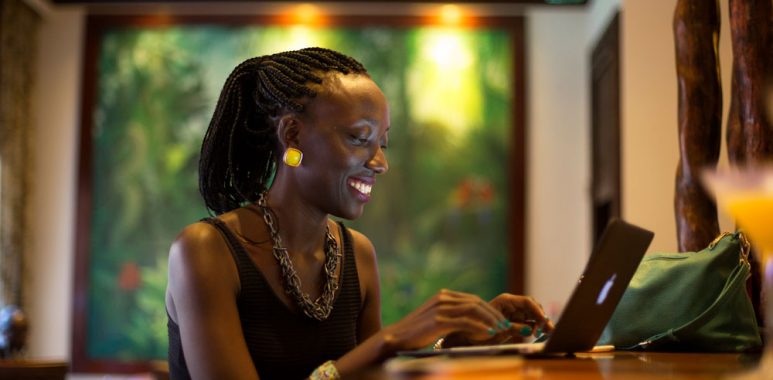
BAL Echoes from Dakar Part I In Conversation with Usher Komugisha
Full Court Press was able to catch up with internationally-renowned sports journalist Usher Komugisha, who served as the main sideline reporter for the BAL Sahara Conference fixtures, which took place from 5-15 March in Dakar, Senegal. This is Komugisha’s second season as a BAL reporter and despite being on mission to cover the FIFA World Cup Playoff pitting defending African champions Senegal against Egypt, she was kind enough to give us her impressions about the action that took place in Dakar.
In your opinion what has contributed to the significant increase in the quality of basketball which we saw on display during the Sahara Conference leg of BAL 2022?
Usher: We must remember that when the first edition of the BAL was organised in May 2021, the world was just over a year into dealing with the Covid-19 pandemic, with the so-called Delta variant of the virus ravaging communities across the world. This state of affairs had an extremely negative impact on sport in general and basketball in particular, as local leagues were suspended across countries with BAL representatives. This was the case with Nigeria, which had cancelled two seasons as a result of Covid-19. In this regard, it was no coincidence that three of the BAL 2021 semi-finalists; Patriots BBC (Rwanda), Petro de Luanda (Angola) and eventual champions Zamalek (Egypt) hailed from nations which had resumed domestic league competition during the course of 2020.
Taking into considering that Covid-19 restrictions have been significantly relaxed across the vast majority of African countries, BAL 2022 participants have had a better chance to prepare in contrast to 2021. This has been most palpable with respect to overall level of fitness seen from players heading into competition and the fact that teams could make more judicious decisions with respect to player recruitment and roster construction. Furthermore, the fact that the games were spread out over 10 days, which guaranteed teams had sufficient rest periods, also contributed to overall improvement in play.
The qualification of seven new teams has also contributed to the improved play. The debutants for Sahara Conference play; Dakar Université Club (DUC), Ferroviário da Beira, Rwanda Energy Group REG and SLUC Seydou Legacy Athlétique Club (SLUC) all witnessed the level of competition on display during the BAL 2021 edition. Therefore, they were not novices with respect to the level intensity and standard of play expected from them and they all brought their best game during the first round of play.
What role did foreign basketball players and coaches have in relation to this overall improvement?
Usher: The BAL has become a very attractive playing option for a lot of high quality foreign players based across Europe and North America. In addition to this category of players, there has been significant buy-in for the BAL project, by overseas-based African players who possess dual nationalities, which is also a very important development. This scenario boded well for all the participating teams, as many of the foreign based players, some who have NBA, G-League and NCAA Division I experienced, added significant value to the rosters and the competition as a whole. In the domain of coaching, it was also great to see the involvement of well experienced coaches, notably; former NBA and Euroleague veteran Robert Pack (REG) and Australian trailblazer Liz Mills (AS Sale) during Sahara Conference play And while the presence of these foreign coaches has added significant value, we cannot underestimate the synergy and symbiose which they had with their African assistants, a scenario which was most relevant with the coaching staff of Sahara Conference winners REG.
What was the most surprising first round result?
Usher: REG finishing top of the Sahara Conference and along the way upsetting 2021 BAL runner’s up US Monastir, who were tipped as favourites to win the first round of play. REG, who defeated the Patriots BC to win the 2021 Rwandan league and qualify as BAL 2022 had an added amount pressure to qualify for a couple reasons. Firstly, the Rwandan capital, Kigali, will host the last round of BAL 2022. Secondly, the government-run Rwandan Development Board (RDB) has invested significant resources to ensure that Rwanda becomes a hub for the growth of basketball on the continent. In this regard, it would have been a travesty for REG to not be part of last leg of the competition, taking place in their own backyard.
And what were the major first round disappointments?
Usher: DUC’s first round elimination was a huge let down, considering that, they were playing at their home arena and the amount of resources and support Senegalese authorities had contributed towards their BAL campaign. Head coach Parfait Adjivon did not grant sufficient playing time former French Pro A champion Jordan Aboudou and was unable to properly manage his squad rotations.
US Monastir finishing second was another shortcoming during the Sahara Conference proceedings. Monastir came out guns blazing during their four games, led by the duo of South Sudanese-Lebanese star Ater Majok and Tunisian international Faras Layani. However, by the final game against REG, it as obvious the players were tired. The injury to Ivorian international and 2021 BAL champion Sory Diabaté, did not also help Monastir’s cause.
What were the organisational high points of this round?
Usher: The BAL caravan carried out across different cities was an innovative mechanism to promote the organisation of the competition. Furthermore, the Dakar leg of the 2022 edition BAL, was turned into a holistic experience, as players were taken on excursions to emotive tourist sites including; the Gorée Island slave lodge. Seminars and symposiums were held, wherein, discussions centred around important topics such as improving the lives of the girl child, gender-based violence, investment promotion in Africa and women’s empowerment amongst others. The creation of the BAL Elevate programme, which saw NBA Academy Africa player’s drafted by BAL franchises, was another manifestation of the BAL’s commitment towards ensuring African youth benefit from this league.
Kumongisha was all round satisfied with the first round of play and believes the Nile Conference round which will take place from 9-19 April in Cairo, Egypt, shall be even more explosive than the Dakar fixtures were.
